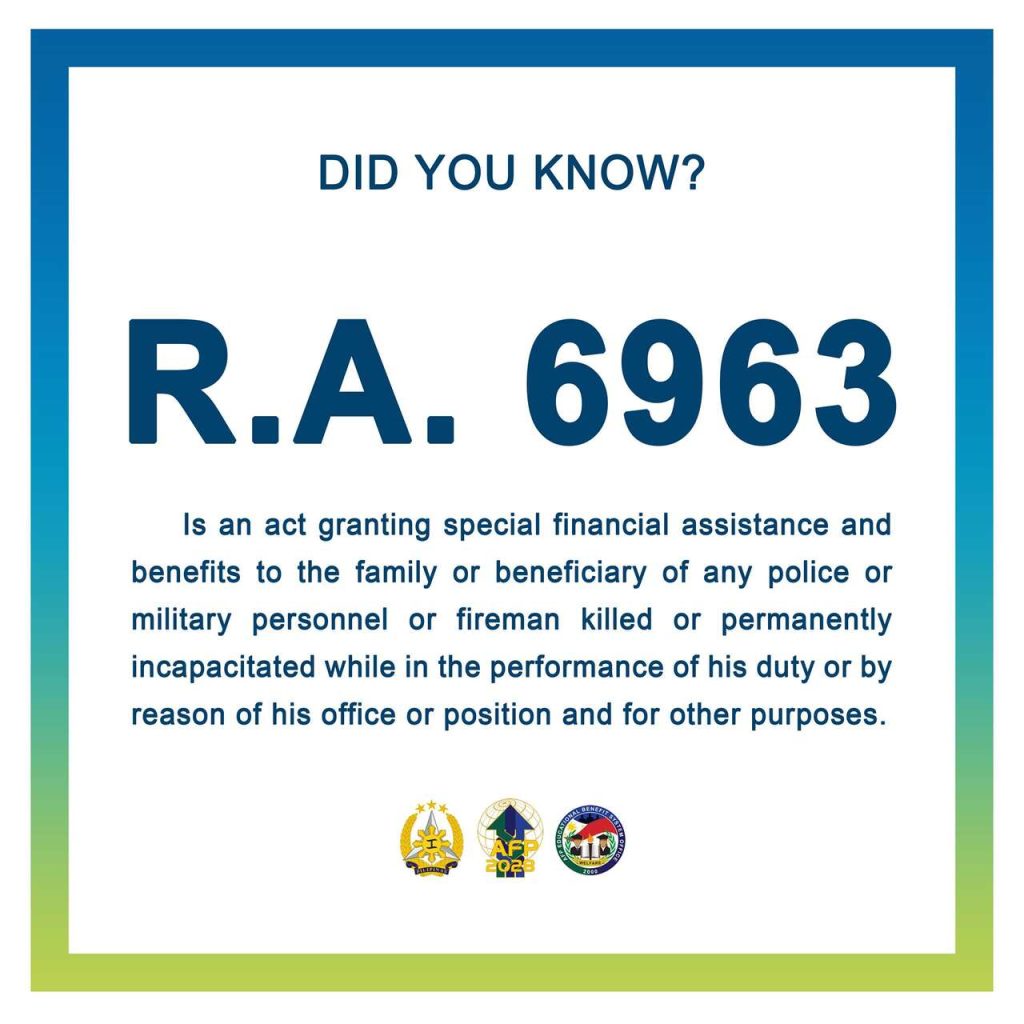On September 4, 1990, RA 6963, officially titled as “An Act Granting Special Financial Assistance and Benefits to the Family or Beneficiary of Any Police or Military Personnel or Fireman Killed or Permanently Incapacitated While in the Performance of His Duty or by Reason of His Office or Position and for Other Purposes,” was enacted to provide special financial assistance to the family of a police, soldier, or fireman who are killed or permanently incapacitated while performing their duties. This extra compensation was designed to support the families who are usually left with sudden financial burdens, especially when it is the main breadwinner that falls due to their position or in the line of duty.
This law recognizes the sacrifices of these uniformed personnel and aims to help their dependents—spouses, children, and other family members—continue with their lives. In this guide, we’ll explain what RA 6963 is all about, who can claim, what benefits are included, and how families can apply.
History and Background

Republic Act No. 6963, also known as the “Special Financial Assistance Act,” was enacted in 1990 to provide additional benefits to the families and dependents of police, military, and other uniformed personnel who were killed or permanently incapacitated in the line of duty. The law was created in recognition of the risks faced by law enforcers and soldiers in safeguarding national security and public safety. It grants special financial assistance, including lump-sum benefits and scholarship privileges, to ensure the welfare and future of their surviving families. Overall, RA 6963 serves as both a compensation mechanism and a form of gratitude from the government for their sacrifice and service to the nation.
It is usually granted to the family of a police, soldier, or fireman who:
- Is killed while performing official duty, OR
- Becomes permanently incapacitated due to an incident connected to their position.
This benefit is given on top of other regular compensation, pensions, or insurance that the family may already be entitled to. The intention is to give extra support in special circumstances, such as killings, ambushes, or incapacities that happen because of the risks tied to being in uniform.
How Much is the Special Financial Assistance?
Families are entitled to a lump sum equivalent to:
- Six (6) months’ worth of the officer’s average salary during the last 12 months before death or incapacity
- This includes allowances and bonuses
- The benefit is not part of the estate of the deceased
- Exempt from taxes, garnishment, and any legal attachments
For example, if a police officer was earning an average of ₱40,000 per month (including allowances), the family would receive ₱240,000 in financial assistance under RA 6963.
Who Can Receive the Benefit?
The law specifies who qualifies as a “family” for purposes of receiving assistance. The order of priority is:
- Surviving legal spouse and legitimate children
- Parents
- Brothers and sisters
- Aunts and uncles
Note: For Muslim personnel, the Code of Muslim Personal Laws (Shari’a) applies when identifying rightful beneficiaries.
This means the assistance automatically goes to the spouse and children first. Only if they are unavailable will it go to parents, then siblings, then extended family.
Requirements
Before applying, you will need to prepare the following:
- Duly accomplished application form (provided by the concerned agency, e.g., NAPOLCOM, AFP, or other uniformed services).
- Official line-of-duty report or certification of death/incapacity issued by the concerned agency.
- Death Certificate (if deceased) or Medical Certificate/Disability Certification (if permanently incapacitated).
- Marriage Certificate (for spouse beneficiaries).
- Birth Certificates of children/dependents (issued by PSA).
- School Certificate of Enrollment (if claiming educational assistance).
- Valid government-issued IDs of claimant/beneficiaries.
- Barangay Certificate of Residency of the claimant.
- Special Power of Attorney (SPA) if filing through an authorized representative.
- Other supporting documents as may be required by the implementing agency (e.g., service record of the deceased/incapacitated personnel).
Step-by-Step Procedures
Once you are ready, here’s how the process works:
Step 1. Certification of Death or Incapacity
- For death: the unit or station commander issues a written certification of the fact and circumstances.
- For incapacity: a medical officer designated by the AFP Chief of Staff or PNP Director General issues the certification.
Step 2. Submission to Cashier
- The certification is forwarded to the cashier of the office/unit where the personnel last received salary.
Step 3. Release of Benefit
- The cashier must release the financial assistance within 3 days of receiving the certification.
Step 4. Reporting
- After payment, the unit must submit a formal report (including death or incapacity certificates) to the Secretary of National Defense (military) or the PNP Director General (police/firemen).
Other Benefits Under RA 6963
Aside from the lump-sum assistance, RA 6963 provides long-term support for dependents.
1. Hospitalization Benefits
If the personnel is injured while on duty, all hospital expenses are covered by the office, charged against salary savings. Families don’t need a separate appropriation or approval.
2. Employment Privileges
- The surviving spouse gets priority employment in government agencies, if qualified.
- If the spouse cannot work or waives the privilege, an employable child may avail of the employment slot.
This gives families a way to regain financial stability after the loss.
3. Scholarships for Children
All children of the deceased or incapacitated personnel are entitled to scholarships up to college in nonexclusive institutions.
- Coverage: Tuition and miscellaneous fees
- Paid directly to the school by either:
- NAPOLCOM (for police/firemen)
- DND (for military personnel)
- Requirement: Present approved enrollment or registration form
This benefit helps ensure that children of slain or incapacitated heroes can continue their education without financial barriers.
Where Do the Funds Come From?
The program is funded as follows:
- Funded through firearms license fees collected by the Philippine Constabulary.
- The first year’s collection served as the initial reserve.
- Succeeding years replenish the fund through continuous firearms license fees.
- Administration:
- NAPOLCOM for police/firemen
- DND for military personnel
Penalty for Non-Compliance
To protect families, the law punishes anyone who delays, refuses, or prevents payment of the benefit.
- If found guilty, the person responsible is dismissed from office through administrative proceedings.
This ensures families are not left waiting unnecessarily during an already difficult time.
Scenarios Covered by RA 6963
To help you understand how the law applies, here are examples:
- Killed in ambush: A police officer assassinated by armed groups due to his position → Covered.
- Killed in accident while on duty: A soldier en route to operations who dies in a vehicle crash → Covered.
- Permanently incapacitated in rescue: A fireman injured during disaster response and unable to return to work → Covered.
- Death by natural illness unrelated to duty: Generally not covered, unless directly linked to the position or duties.
Frequently Asked Questions (FAQs)
For your reference, here are some common questions and answers about the provisions of RA 6963:
1. Does RA 6963 apply only to combat deaths?
No. It covers deaths and incapacities caused by any incident related to duty or official position, including ambushes, rescue operations, and accidents.
2. What if the officer was killed while off-duty?
If the death is connected to their position as uniformed personnel, such as being targeted because of their role, the law still applies.
3. Can families still claim pensions or insurance aside from RA 6963?
Yes. RA 6963 is separate and additional to other pensions, donations, or insurance benefits.
4. How fast is the payout?
The law requires release within 3 days after certification is received by the cashier.
5. Who should the family approach first?
Start with the unit commander of the deceased or incapacitated personnel to secure the certification needed.
Video: RA 6963 In Action
The special financial assistance under RA 6963 is a lasting recognition of the sacrifices made by uniformed personnel. While nothing can replace their loss, the law somehow provides financial relief, educational opportunities for children, and employment support for dependents. Families of fallen heroes should be aware of their rights under the law to claim what is rightfully theirs. Only by knowing can they find some measure of stability and support during the most difficult times while also honoring the legacy of service and sacrifice left behind by their fallen family members. To learn more, you may watch this video:
